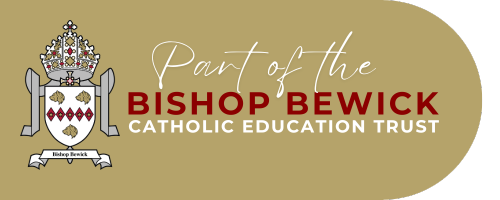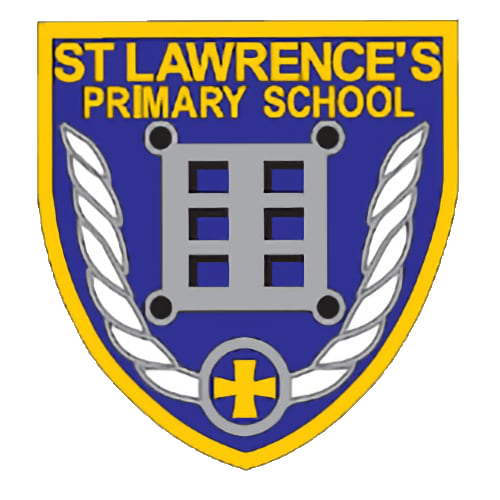
RELIGIOUS EDUCATION
RELIGIOUS EDUCATION
INTENT:
At St Lawrence’s we are committed to the Catholic Faith, recognising and valuing every individual as special and unique in the image and likeness of God. Religious Education in our school is central to the educative mission of the Church and intrinsically linked with our school Mission Statement and permeates everything that we teach.
St Lawrence’s Mission Statement:
God’s love is at the heart of our school.
We care for each other, treating others as we wish to be treated ourselves.
We will always try to be the best that we can be through tolerance, kindness and respect.
Loving Jesus,
Loving learning,
Loving life.
Our Mission Statement sits alongside the Gospel values of; Courage, creativity, thankfulness, responsibility, compassion, peace, service, justice, trust, hope, love, forgiveness, friendship, humility, generosity and reverence and respect.
At St Lawrence’s, RE lessons are steeped in faith and are enjoyable, where each child feels they belong to our school community and always feel included and accepted. Our aim is that in RE lessons everyone feels respected for their beliefs and expressions of faith and where ultimately, all children achieve.
These intentions fall in line with our mission of TOLERANCE, KINDNESS and RESPECT.
IMPLEMENTATION:
At St Lawrence’s we believe that Religious Education is at the core of the core curriculum. Religious Education is the systematic study of the teaching of the Church and the mystery of Christ and is a rigorous academic subject in its own right. As such it is to be taught, developed and resourced with the same commitment as any other subject.
Religious Education - Curriculum Time Allocation:
10% of curriculum time is allocated to Religious Education. This does not include Collective Worship.
PROGRAMME OF STUDY:
To fulfil the above aims and to address the four areas of study outlined in the Religious Education Curriculum Directory, 2012 – Revelation, Church, Celebration and Life in Christ - the ‘Come and See’ programme is used as recommended by the Diocese. Teachers plan exciting, inventive and focussed
lessons which offer challenge to all pupils from Come and See. RE is assessed from the Age Related Standards. In each unit, children will experience a wealth of varied activities and experiences including; visits, art work, music, varied stories, symbols and rituals, people and objects.
PROCESS:
Religious Education is taught through the process of Explore, Reveal, Respond. This follows the pattern of: the human search for meaning, God’s initiative in Revelation and the response in faith. This pattern is outlined both in the Catechism of the Catholic Church and in the Curriculum Directory.
METHODOLOGY:
A variety of teaching and learning strategies will be used from across the curriculum adapted appropriately to the needs and learning styles of pupils.
INCLUSION:
All pupils in our school, irrespective of ability, faith and background will have appropriate differentiated access to the Religious Education programme.
OTHER RELIGIONS:
Two other religions are taught from EYFS to Year 6 following the programme of study in ‘Come and See’. These are Judaism, which is usually taught in the Autumn, and Islam, which is taught either in the Spring or Summer. At least one week’s teaching and learning time per year is given to each.
CATHOLIC LIFE:
Opportunities for celebration, prayer and reflection in implicit and explicit ways are planned throughout the year. For example; Masses, Liturgies, Collective Worship, Prayer Spaces (Mission Week), prayer journaling, creative prayer, ‘Open The Book’ – drama group.
IMPACT:
Evidence of impact in RE is measured through ARS and monitored internally through our in- school monitoring programme and through the rigorous diocesan moderation process. Progress and impact is measured through moderation of planning, lessons and books. Cluster meetings with other RE coordinators ensures progress and good practise takes place across school.
Impact is not just collated through books or attainment but through the vibrant Catholic Life of our school; all of our pupils contribute to collective worship, liturgies and catholic life. Impact is also measured through pupil voice, staff and parent questionnaires.
Data over time has been broadly in line with other core subjects and also with Diocesan data.
A slightly higher number achieved the higher standard in RE than in Literacy. Boy and girl attainment was broadly similar as was Pupil Premium and non PP, though a higher number of non PP children are working at a higher standard. There is a boy/girl gap in RE. There is very little difference between PP and non PP at expected.
RELATIONSHIP AND SEX EDUCATION:
At St Lawrence’s, Relationships and Sex education is taught through a whole school policy which has been adopted from the Diocese and scheme of work ‘Journey in Love’, and, where possible, is integrated into other areas of the curriculum such as religious education, science and PSHE. It is always taught within the context of the church’s teaching on sexual relationships. Parents are given the opportunity to discuss what their child will be learning so that they can support their child’s work at home. Any questions that children ask are answered sensitively and in a caring manner. Lessons and resources are always chosen to suit to the age of the children. A Parent’s Guide can be found on the school’s website


